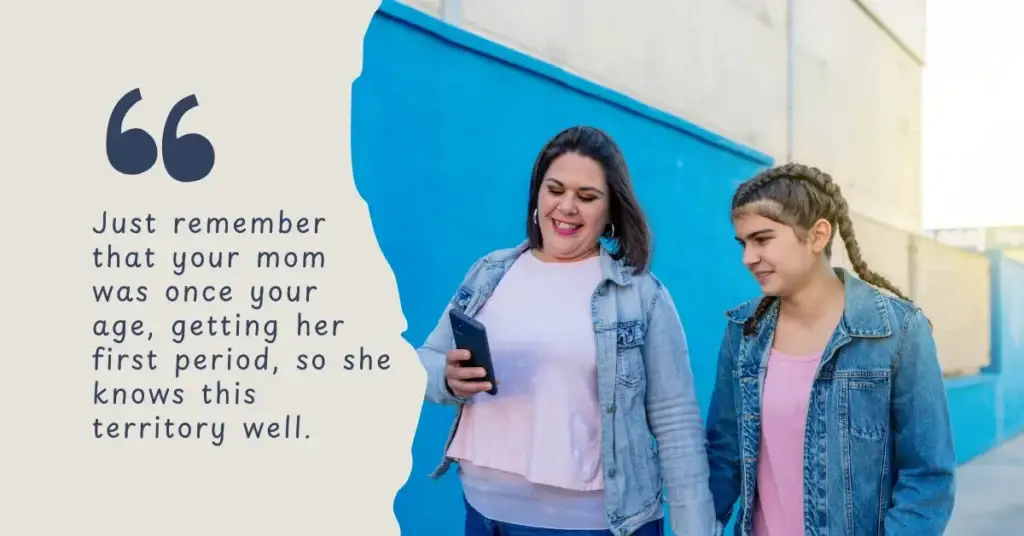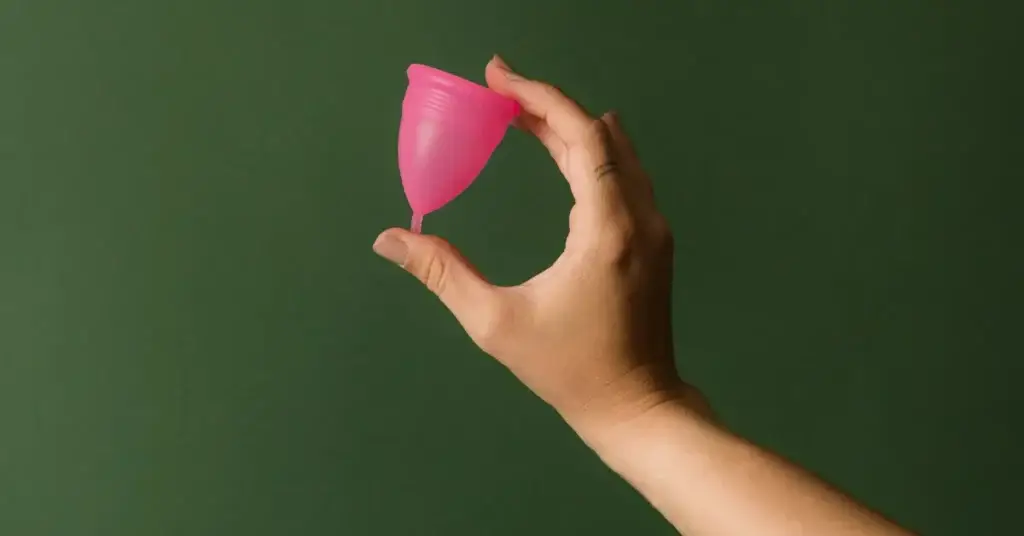Getting your first period is a significant milestone in life, but it can also feel overwhelming, especially when it comes to how to tell your mom about your first periods or talk to your parents about periods.
Many people feel nervous or unsure about how to start the conversation, but remember, there’s absolutely nothing to be ashamed of or embarrassed about. Periods are a natural part of life, and your parents are likely expecting it to happen eventually.
If you’re unsure how to approach the topic, here are some practical, stress-free ways to tell your mother that you got your period or talk to both parents about it.
9 Ways to Tell Mom ( or Dad) About Your First Period
I’m sharing 9 ways to make this conversation easier, whether you want to tell your mother that you got your period, involve your dad, or even just figure out how to say, “I started my period.” So, let’s dive in and make this whole thing way less stressful, okay?

1. Keep It Casual
One of the easiest ways to bring up the topic is to keep the conversation casual. You can indirectly mention it by asking questions like, “Mom, when did you get your first period?” This approach helps ease into the topic without directly saying, “I started my period.” It also opens the door for your parents to ask questions like, “Did you get your period?” which can make the conversation flow more naturally.
For example, you could say:
- Mom, I was wondering, how old were you when you got your first period?
- Did you know much about periods when you were younger?
These questions not only help you gather information but also signal to your parents that you’re ready to talk about the topic.
2. Be Direct
If you’re comfortable, being direct is often the simplest way to talk to parents about periods. Just say, “I started my period.” Once the topic is out in the open, your mom or dad will likely take over the conversation and guide you through what to do next.
Parents can have different reactions; some might be excited, others nonchalant, but remember, they know this is a natural part of growing up.
Here’s how you can phrase it:
- Mom, I got my period today. Can you help me figure out what to do next?
- I started my period, and I need some advice.
Being direct can feel scary at first, but it often leads to the quickest resolution. Your parents are there to support you, and they’ll appreciate your honesty.
3. Write a Script
If the thought of starting the conversation makes you nervous, try writing a script. Jot down what you want to say, including any questions you have. You don’t have to read it word for word, but having a guideline can help ease your nerves.
For example, you could write:
- Mom, I got my period, and I’m not sure what to do next. Can you help me?
- I started my period, and I need some supplies. Can we talk about it?
This approach ensures you don’t forget anything important and helps you feel more prepared. You can even practice saying the words out loud to build your confidence.
4. Write a Note
If speaking face-to-face feels too intimidating, writing a note is a great alternative. You can keep it simple with something like “I got my period,” or include more details if you’re comfortable.
Leave the note somewhere your parents will find it, like on their pillow or in their bag. This method takes the pressure off having to say the words out loud and gives your parents time to process the information before responding.
Here are some examples of what you could write:
- Mom, I started my period today. Can we talk about it when you have time?
- I got my period, and I need some help. Can you ask Mom to talk to me?
Writing a note is especially helpful if you’re shy or worried about forgetting what to say.
5. Show Your Underwear
If you’ve bled through your underwear, you can use this as a way to start the conversation. Change out of your underwear, but don’t wash it yet. Call your mom into your room and show her the stained underwear.
You don’t even have to say anything; the visual speaks for itself. Your mom will likely recognize what it means and start the conversation for you.
This method also works with dads. While it might feel awkward, showing your dad the stained underwear can help him understand what’s happening. He might not know all the details, but he’ll recognize that it’s time to involve your mom or another trusted female figure.
6. Wait for the Right Time
If you’re not ready to talk about it yet, that’s okay. You can wait until you feel more comfortable. In the months leading up to your first period, your body might start producing vaginal discharge, which is a sign that your first period is on its way.
You can mention this to your parents if you feel comfortable, or wait until your period actually starts.
For example, you could say:
- Mom, I’ve been noticing some discharge in my underwear. Is that normal?
- Dad, I think my body is changing. Can we talk about what’s happening?
Waiting for the right time can help you feel more prepared and confident when you’re ready to have the conversation.
7. Talk to Someone You Trust
If you’re not ready to tell your mother that you got your period, consider talking to someone else you trust. This could be a school nurse, a teacher, an older sister, or even a friend’s parent.
They can offer support and advice on how to approach your parents. Sometimes, having someone else guide you through the process can make it feel less daunting.
Here’s how you can approach it:
- Hey [trusted person], I started my period, and I’m not sure how to tell my parents. Can you help me?
- I’m feeling nervous about talking to my mom about my period. Do you have any advice?
Talking to someone you trust can help you feel less alone and more prepared for the conversation with your parents.
8. Ask to Talk to a Female
If you live with just your dad and feel uncomfortable talking to him about periods, you can ask to speak with a trusted female figure instead. This could be an aunt, grandmother, or family friend.
You can say something like, “Dad, I need to talk to a woman about something personal.” Most dads will understand and arrange for you to speak with someone you’re comfortable with.
Here’s how you can phrase it:
- Dad, I have some questions about my body, and I’d feel more comfortable talking to a woman. Can you help me arrange that?
- I need to talk to someone about something personal. Can you ask [female figure] to call me?
This approach ensures you get the support you need while respecting your comfort level.
9. Make It Fun or Dramatic
If you want to lighten the mood, you can make telling your parents about your period fun or dramatic. Play a game of charades, create a PowerPoint presentation, or write a funny note. For example, you could write, “Guess what? I’m officially a woman now!”
This approach can help ease any tension and make the conversation feel less serious.
Here are some creative ideas:
- Create a “Period Announcement” card and hand it to your parents.
- Play a game of hangman with the phrase “I got my period.”
- Act out a short skit to announce the news.
Making it fun can help you feel more in control of the situation and turn a potentially awkward moment into a memorable one.

Why It’s Important to Talk About Periods
Talking to your parents about your period is an important step in understanding your body and getting the support you need. Whether you choose to tell your mother that you got your period or involve both parents, remember that periods are a natural part of life.
Also Read: 20 Signs of First Period Starting Soon
Your parents have likely been expecting this moment, and they’re there to help you navigate it.
If you’re feeling nervous, remind yourself that millions of people go through this every day. You’re not alone, and there’s no “right” or “wrong” way to have this conversation. The most important thing is to communicate your needs and ask for help when you need it.
Final Thoughts
Figuring out how to tell your mom about your first periods or talking to your parents about periods doesn’t have to be stressful. Whether you choose to be direct, write a note, or involve someone else you trust, the goal is to feel comfortable and supported. Remember, periods are nothing to be ashamed of—they’re a sign that your body is healthy and growing.
If you’re still feeling unsure, take a deep breath and remind yourself that this is a normal part of life. Your parents are there to help you, and once the conversation is over, you’ll likely feel a huge sense of relief.
You might love …
 First Period Guide
First Period Guide  First Period Guide
First Period Guide  First Period Guide
First Period Guide  First Period Guide
First Period Guide  First Period Guide
First Period Guide  First Period Guide
First Period Guide Disclaimer
The information provided in this article is for educational and informational purposes only. It is not intended as medical advice, diagnosis, or treatment. Always consult a qualified healthcare professional before making any decisions regarding your menstrual health. If you experience severe pain, irregular cycles, or other concerning symptoms, seek medical attention.